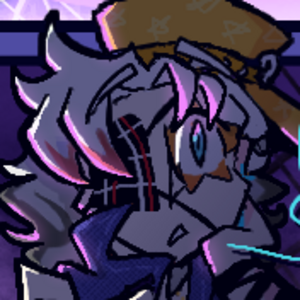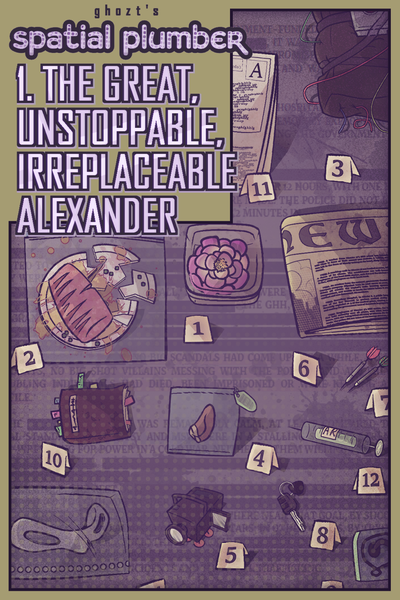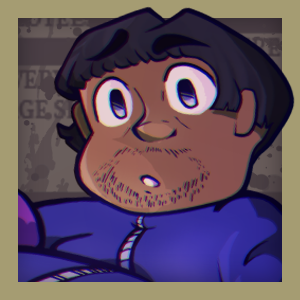Neville dragged himself out of bed and to the nearest window, just letting a little bit of light through the plastic blinds’ slats with his fingers. Letting the blinds cut out the sun again, Neville quickly checked his calendar, crossing the current cell out with a red pencil. He slid into his work attire; yellow plastic boots that showed their age through bumps and cuts but retained their neon-bright colour, a purpley-blue zip-up anorak made of latex, matching pants, a cumbersome but convenient utility belt that he had incremented with more and more stapled pouches.
Another day. Another attempt.
Neville Elire Schifozzo was once a GHH hero. His memories seemed so distant, so much so they might not have happened at all - or at least, not in the way he remembered them. Regardless of the past, though, these days, Neville was seen as a vigilante. ‘Vigilante’ was a term used by the press and government to designate people who fought - or claimed to fight - crime and abilitied crime, but were neither contracted nor endorsed by authorities, thus acting in plain illegality. A few resorted to vigilantism after failing the GHH’s job interview ; some found the GHH’s strict modus operandi too restrictive; others had an inherent bias against the GHH, either from their upbringing or because of some rumour, controversy or other.
Vigilantes had a poor reputation in pretty much every circle. To the government, they were entitled, incompetent and further hassle to deal with; to the underground, they were heroes that were harder to corrupt and deal with than actual GHH heroes. To civilians, they were dangerous and pretty much no different from villains; To super-fans, they were boring, usually lacking the spice of proper heroes and villains, given that they weren’t part of the refined chess game that was the villain-versus-hero scene. ‘Vigilantes’ as a term was an attempt to categorise anyone who even attempted to avoid being placed into the status quo categories - in other words, an attempt to spite people who dared go against expectations.
Neville, though, likely, because of his GHH days, didn’t suffer that same backlash. ‘Plumber’ wasn’t exactly the most glamorous of themes, nor was his costume the most appealing out there, but it was endearing enough to make him stand out. His machines were equally quirky, with their nonsensical pipes and gears and wheels and valves. They looked like something cartoon characters would make out of rubbish in their garage, and almost all of them did something different. The GHH wasn’t the only one making a list of them; there were entire fan-wikis wherein each and every one of Neville’s machines was listed and given silly nicknames. Forums would discuss and theorise about the details of his ability. Other forums hazarded guesses regarding his relations with the Enigma - that was the ‘official name given to that unknown portal-wielding pimp. Some went a bit far, making all sorts of oddball comparisons between him and Neville’s father or grand uncle, which the humble plumber would have found quite insensitive had he been aware of it. Luckily, he usually tried to stay away from attention - the flashy gear just happened to be the most appropriate outfit he owned for this kind of thing. He might not even have come up with the name ‘Spatial Plumber’ himself, but he couldn’t quite remember that either. He was too busy to make sense of all that mess. Even if some kid over the world wide web figured out his secret - and that was quite the ‘if’ - Neville didn’t feel it would matter to him in the long run. He’d just move on, like always.
12535. Two years after Alexander’s first appearance. In just three attacks, the mysterious silver-clad clown had entwined both the press and public around their finger, keeping the entire capital holding in their breath, wondering when the terrorist would strike next - Alexander had put such excellent effort into wiping away their tracks that no hint or pattern could be pinned down by the authorities ; despite the dozens of theories online, no one could claim for sure to know when the silver danger would show up next.
Neville had to be fast. Alexander was headed for D6’s hospital ; a rare occasion for him to stop them - but if he wanted to take that chance, he couldn’t afford to let the GHH catch up. The plumber needed to set up all of his traps before they did. Filling a hospital with Neville’s gadgets would inevitably cause accidents - but those sorts of concerns were for the GHH to worry about. Most vigilantes focused exclusively on catching their target, disregarding collateral damage.
If they were treated with more respect by the press, and had the sort of theatrical presentation villains and heroes were known for, vigilantes would likely be even more popular than most heroes based on this go-getter attitude alone. The GHH imposed strict protocols on its employees to ensure that no matter the emergency, they had the perfect plan to evacuate, protect and treat civilians caught in attacks before anything else. Teleported ambulances, dimensional shortcuts, group invisibility, heroes with optimal abilities in regards to evacuation were immediately informed of the latest incidents. The GHH did live up to its primary purpose ; protecting the people. It had saved in extremis hundreds of civilians in unsolvable situations and managed to undo every human trafficking ring the underground had tried setting up so far - though even there, the GHH wasn’t above controversy : after all, the Magnolia case had undeniably trumped them for decades. While in pragmatic and humanitarian eyes, the GHH’s dedication to this philosophy was its most respectable trait. But in the eyes of the heroism’s target audience, it lacked the appeal and romance of a thrilling chase punctuated by bloodshed and explosions - an appeal that old-school villains, Neville-like vigilantes and dissident heroes embodied.
Ironically, the GHH’s thoroughness had ensured that those three demographics would never reach the level of their predecessors : first-generation villains, who benefited from the GHH’s non-existence, the novelty of abilities and a decade of civil unrest. It was as though even the most insignificant of abilitied criminals would rack up an insane body count without trying - just as a side effect of using their ability in a world that barely understood them. The First District trio embodied this trend. Bleeding Heart alone, fondly as many remembered her, thrived on the brutal murder of policemen for the protection of the abilitied minority - 234 over her entire career as a magical girl, and an unclear number of additional deaths over the course of her dictatorship. Iron Will, Bleeding Heart’s right hand and consultant, had once frozen an entire building - its inhabitants included : the Ice Palace incident alone accounted for 59 casualties. Open Hand, the District’s ‘kindly prophet’ and emotional leader, nonetheless had spread her benevolent message through rising corpses from the dead - deaths she oft had a part in.
Even with these deaths in mind, history gave the trio the legacy of heroes ; the very first villains that were still remembered as such had an even bloodier record. Medea and Hyacinth's prison breakout and daredevil year-long road trip around the country had left dozens of hotels in shambles, the duo making a habit of massacring all possible witnesses as they drove back and forth ; after their return to the capital, the two founded MSW, which would grow exponentially and was indirectly responsible for the majority of hero and villain deaths from that point on.
Incalculable.
Such bloodshed was unheard of these days - Alexander aside - largely thanks to the GHH’s intensive ability research giving them a better understanding of and ability to predict them accurately - and of course, its large and diverse roster of heroes. The most common casualties were, ironically, the GHH’s employees’ own lives. A hero memorial served as the governmental parliament’s backyard - stone slabs upon stone slabs of engraved names, aliases and years. A place for grief and honour, that served as a grim reminder that the capital’s favourite form of entertainment involved real lives and deaths - pushed around like pawns by a flawed system. Even this place was stained by the ranking system. As of 12500, A through C heroes would only be marked if they died while on the field or at the hands of a villain, while all Ss were written down, even if they’d long retired or quit. Rebellious graffiti completed the picture - a grey and morose picture, a series of identical blocks of stone, grotesquely decorated by splashes of colours - both flowers from the grieving, and spraypaint from the disrespectful. Looking at the square as a whole, they blended together. The memorial served as an eerie diorama of the capital within which it stood.
Alexander wasn’t going to be caught so easily. Neville knew he had to be fast. He needed to get to the hospital, and-
The plumber stopped in his tracks - an unusual gathering caught his eye.
Police and GHH vehicles, deployed all around the Lighthouse, an office building, famous for the atypical architecture that had earned it its nickname, and for housing the HQs of three of the country’s most prevalent newspaper companies, among other less notable businesses. From floors 2 to 7, the government’s own news network, known simply as the 24”7, reporting mainly political, humanitarian and hero-related news, as well as search warrants. It had a bad reputation, though it usually relayed information accurately. Floors 9 to 16 housed the Grey Menteur, an extremely controversial tabloid newspaper that most accused of ‘pulling 90% of their articles out of their ass’ with good reason, but who had gotten enough lucky scoops and educated guesses turn out true to amass a large reader base and influence. They mostly reported hero, vigilante and villain related rumours and accusations, and employed nothing but espers of various calibre. Lastly, on floors 17 to 27 resided the single largest, independent news company in the country - the Dragon’s Breath. It had a nigh spotless track record regarding accuracy and professionalism, and even their detractors had to admit they were entirely innocent of yellow journalism, which couldn’t be said of many other newspapers. It was doubtlessly politically biased against the government, however. It was also the company Neville’s father worked in.
His father was in that building, surrounded by police and GHH vehicles and staff. Which meant there must’ve been an intrusion. A villain intrusion. Granted, if a villain was going to have an issue with any of the newspapers whose head offices laid there, it was most likely the Grey Menteur rather than the one his father worked in, but... He couldn’t take that chance. Hopefully, he could still get to the hospital on time, but if it came down to it, Neville would choose to ensure the safety of his father over catching Alexander.
Lesion glanced down through the Lighthouse’s lightly stained windows from up on Floor 9 ; the police were already there, making their way in. Good! With their exit secured and their target locked down, they wouldn’t be long ; they’d be gone so quickly, they worried the police wouldn’t even have noticed.
The redhead casually slid along the floor like an ice skater towards the elevator they’d just come out of, firing their pistol towards the ceiling in a second warning shot to keep their hostages in check. Thankfully - if a little disappointingly - the kinds of people that worked for the Grey Menteur weren’t exactly the courageous sort. The mere sight of Lesion’s trademark attire was enough to scare the lot of them into sitting still - a lavender corset around their waist with nothing underneath, matching dark indigo suit vest and pants that were just a little too large for their teenage figure, the former opening in a large V, letting most of their chest show through, a stand-alone shirt collar made of some thick, black fabric, knee-high leather boots, and a cutesy red string ribbon around their neck that matched the vivid red of their hair - a trait that Lesion shared with the late Acid - otherwise known as Sheryl Nozhnitsy.
A few years after Nozhnitsy T&I’s foundation - once the company was well established, leaving her with a little bit of extra free time - Sheryl had sought to find an heir, to ensure her life’s work would continue on posthumously. She considered simply leaving the Nozhnitsy group to her former gang and family - they were all loyal to her, quite competent and had lived in the underground for the large majority of their life. But in a way, they were the very reason she wanted a protégé of her own - though she’d endeavoured her whole life long to vent out her spite and misanthropy, she wanted a least one person that she could show the care and love she received in her youth to. That someone was Alistair Nozhnitsy - her child. No one knew if the two were blood relatives, but Sheryl had raised them since they were so young, and the two looked somewhat alike, so most assumed so - even if Sheryl had never shown the slightest interest in romance or intercourse, and had never been visibly pregnant as far as her closest acquaintances could tell.
In 12524, Sheryl passed away. She died quite young, much younger than most expected her to. Whether her infantile experience with AR had anything to do with it was unclear. She left behind a six-year-old kid, a growing crime empire, and a world that didn’t remember her existence, but would forever bear the mark of her accomplishments. Her death, like much of her life, had gone as planned. She’d dedicated herself body and soul to the Nozhnitsy Group, willingly living in its shadow, with no desire to take any credit for it beyond the grave. She’d had to step up in person enough times for the GHH to identify her and give her a villain alias, Acid, but they couldn’t even pin down her M.O. She operated in the background, never leaving a trace of her presence.
Alistair hated this. It was unfair. Sheryl had achieved so much, only to turn up a forgotten corpse amongst thousands of average Joes. Though they were determined to keep Nozhnitsy running in memory of their mother, they were horrified to think they might one day share her fate : hence, they applied the same dedication she had put into achieving anonymous revenge into making a name for themselves. Nozhnitsy was stable and running these days, so they had more time on their hand - that, and they mostly left the business side of things to Sheryl’s family, since they’d inherited the company so young that there hadn’t been much of an alternative. This left them able to do more or less whatever they wanted, as long as they vaguely kept Nozhnitsy’s interests in mind - a secondary priority to their main goal : to be remembered. To mark history as Alistair Nozhnitsy - as Lesion - as a villain - as a person.












Comments (0)
See all